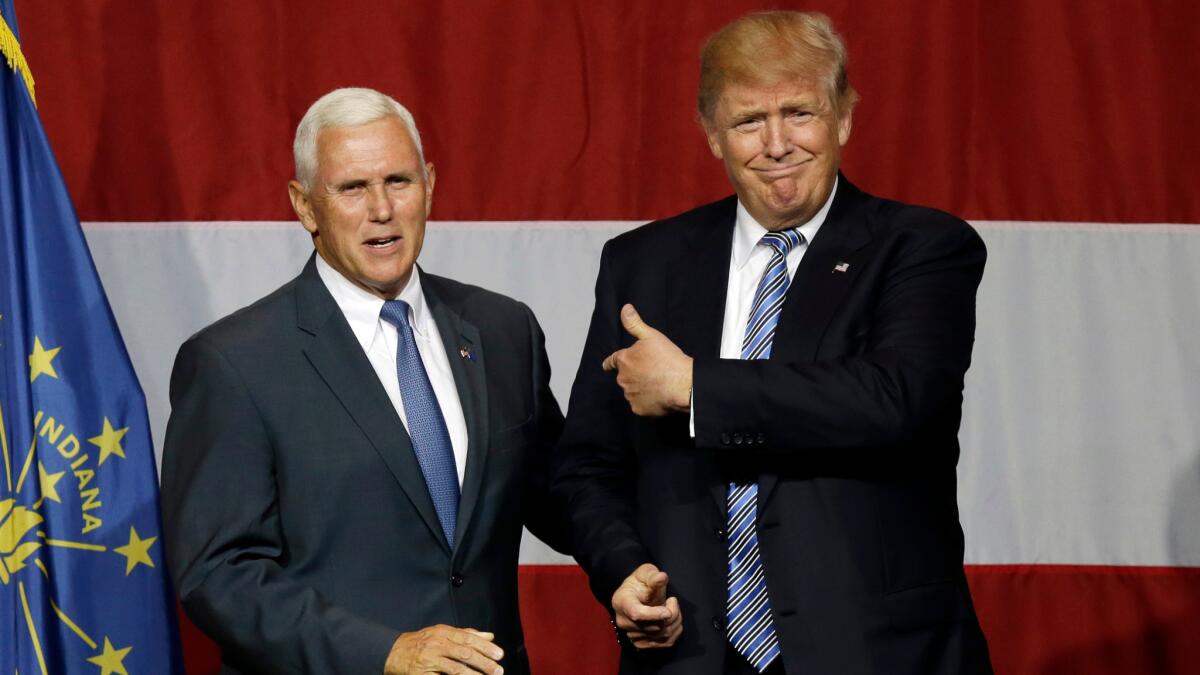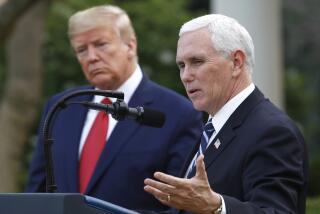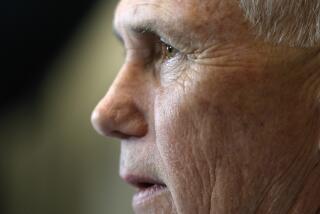Op-Ed: Why Mike Pence was the wrong person to put in charge of COVID-19

Tapping Vice President Mike Pence to oversee the U.S. federal government’s response to the novel coronavirus COVID-19 is a massive blunder on the part of President Trump. Pence, as I documented in a 2018 essay in the Nation, was once in charge of another public health crisis, and he failed utterly at the task.
In 2015, Pence, then governor of Indiana, was alerted to an alarming outbreak of HIV in rural Scott County. Public health officials urged the governor to take immediate emergency measures, including instituting a clean needle exchange. This was not a radical approach. Research has long shown that needle exchanges help get people get into drug treatment and limit HIV transmission, and the Centers for Disease Control and Prevention say they “do not cause or increase illegal drug use” or crime. But Pence looked to theology rather than science, saying he needed to go home and pray about what to do. He ultimately signed an executive order authorizing a temporary needle exchange but said he didn’t “believe effective anti-drug policy involves handing out drug paraphernalia.”
And this wasn’t actually the most dangerous thing he did to make Scott County’s epidemic so awful.
As research published in the British medical journal the Lancet in 2018 showed, the HIV outbreak in Scott County got out of hand because of funding cuts Pence had made to public health and the social safety net. These led, among other things, to the closure of the only provider of testing for sexually transmitted infections in southern Indiana.
Like many communicable viruses, the transmission of HIV is exacerbated by social conditions such as poverty, homelessness, unemployment and a lack of health insurance. When these conditions are coupled with cuts to public health measures, needless HIV outbreaks occur among vulnerable people.
Which brings us to the real reason Pence was so bad for HIV in Indiana — and will be for coronavirus in the U.S. He doesn’t understand the critical role government has to play in ensuring that people have access to healthcare.
As a governing politician, Pence was known for cutting taxes without considering the consequences of his budget-cutting. His policies reduced access to healthcare and social support for the most vulnerable.
In places as widespread as Athens, Greece and Scott County, using austerity budgets to justify cutting public HIV efforts has proven to be harmful, cruel and inefficient. Austerity is never the correct approach to curbing and preventing public health crises, and it could be devastating with COVID-19.
And yet, an austerity mindset — which infects not only Pence but the entire U.S. public health system — is already hampering efforts to contain the novel coronavirus in the United States.
Hospitals have complained that testing protocols are too limited, and the administration has been slow to change them. And cuts in funding for the Centers for Disease Control and Prevention have devastated its epidemic control and prevention efforts.
Also, there’s our sick healthcare system, which is almost certain to hamper efforts to fight COVID-19. A man in Florida got a coronavirus test after a visit to China and reportedly received a hospital bill of more than $3,000. Bills like that give people an economic incentive not to get tested.
And when there is no federal requirement for paid sick leave, workers have an economic incentive to keep working, even when they’re ill.
Even House Speaker Nancy Pelosi has said that once a coronavirus vaccine is available, it should be “affordable” and not “free.” Where public health is concerned, this kind of austerity can be deadly. (One corporation trying to develop a COVID-19 vaccine saw its stocks soar on a day most stocks tanked.)
Facing coronavirus, we don’t need Pence’s moralism and austerity-informed approach, which led to the fastest HIV outbreak in U.S. history. We don’t need him muzzling public health officials. What we need is free testing and treatment; we need protection from predatory medical price gouging, particularly the poorest Americans.
And we don’t just need those things as we face this virus. To prevent and manage future epidemics, which we know will come, we need universal healthcare like Medicare for All and a public health system based on science and best practices.
Steven W. Thrasher is a professor of journalism at Northwestern University and a scholar of HIV/AIDS.
More to Read
A cure for the common opinion
Get thought-provoking perspectives with our weekly newsletter.
You may occasionally receive promotional content from the Los Angeles Times.










